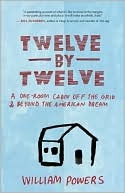William Powers took a break from his career as a globetrotting do-gooder to crash for a while in a 12′×12′ cabin in North Carolina. The cabin’s owner, a doctor and activist who is pseudonomized for the sake of her privacy in the book as “Dr. Jackie Benton,” is a war tax resister who chose the small-cabin, off-the-grid, radically simplified lifestyle as a way of both avoiding income taxes and living a life in solidarity with people worldwide who are less resource-depleting than the typical American.
The 12′×12′ size also falls under the line that defines the sort of habitable dwelling that, according to local laws, must pay property tax, have sewer and electricity hookups, and so forth.
Benton herself is off doing activist work around the Nevada nuclear test site, and her role in the book is mostly as a distant, inspirational guru figure — imagine a sort of ghostly Obi Wan Kenobi smiling and uttering some profound aphorism about The Force from his afterlife perch in the realm of the midichlorians.
The book is mostly about the things that William Powers thinks about as he’s living in the cabin, exploring the area, and meeting the other people in his neighborhood. He thinks about his place in the giant machine that is the global economy and what influence he has over its actions, he tries to learn how to just be in a culture that seems all about do and have, he pines for the daughter he left behind in Bolivia after one of his do-gooder jaunts, he worries, he wonders, he discovers astonishing things about human nature, he makes resolutions.
The book didn’t do much for me. It felt to me like a book too many in this genre, a sort of muzak version of Walden. It skips lightly over a broad swath of the contemporary simple living zeitgeist, pointing out the usual tourist attractions along the way, but never stops anywhere long enough to really dig in and teach us anything new. “Does our culture sometimes value production over life and alienate people to the point where mental illnesses deepen and going postal becomes routine?” You can’t just drop a question like this into a paragraph and then move on to the next thing. Either address it with the depth it deserves or admit that you’re just juggling progressive tropes and use the other end of the pencil for a while.
Maybe I’ve just read too many similar things for me to be able to see the best side of this book. If it were the first such thing I’d read, I might feel differently. Here’s an excerpt that gives some feel for the book’s theme:
At the 12×12 I started dreaming about a soft economy.
Being with Jackie, being alone in her tiny house, provoked a question: How might personal economy and the leisure ethic come together as rebellion? Jackie’s lifestyle is a twenty-first-century Boston Tea Party, but she hasn’t thrown just one product overboard; rather, she’s tossed the whole lot of planet-killing junk. Today it’s not the British Empire colonizing us, but a pervasive corporate globalism. We resist through our vote, and I don’t mean for this political candidate or that, though that’s certainly part of it. We cast powerful votes for the kind of world we want to live in whenever we fish out a twenty or click buy on the Web.
After Jackie’s tea party, here’s what remains on her permaculture ship: a tiny car that she runs on biodiesel; delicious local and organic food, 90 percent of it produced by herself or her neighbors; fresh drinking water she collects herself at a local spring; solar flashlights (she doesn’t use disposable batteries for anything); a slight house, with building materials so minimal that the forests can live; and not a cent into federal war coffers.
She’s part of a larger rebellion that includes [some neighbors he’s introduced us to in previous chapters]; the Slow Food and farmers market movements in the larger Raleigh-Durham-Chapel Hill area; and the budding national renewable energy, natural foods, and national TV-turn-off subculture. There are intriguing trends like the Compact (groups of citizens who join together and buy nothing new for one year), national Buy Nothing Day (no purchases for a day), and Boulder Bucks (cities like Boulder, Colorado, create a parallel currency that circulates only locally, therefore encouraging the local economy). But even if no such efforts existed, each of us possesses an incredibly powerful tool of resistance: our household economy.
It’s been said that only little ideas need patents because the most transformative ideas are protected by public incredulity. Household economy as protest is one of those big ideas. Being at the 12×12 reminded me that I can examine with acute interest every single penny that goes out of my accounts. Is that penny helping create a vital farmers market or McWorld? The Thompsons’s free chickens or Gold Kist’s beakless chickens? A simple elegance that coexists with Bolivia’s rainforests, or a decadence that fosters comfort but destroys a far greater beauty? Ideas like warrior presence, the Idle Majority, and the creative edge, I realized, can be crystallized in my life by becoming aware of personal economy’s radical effects — and changing the direction of pennies.

